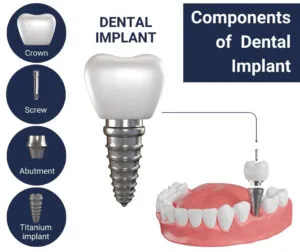Dental implants are an effective tooth replacement option that provide a long-lasting and natural-looking solution for missing teeth. They are essentially artificial tooth roots (made of titanium) that are placed into the jawbone, providing a stable foundation for a replacement tooth or teeth.

The process of getting a dental implant typically involves several appointments over a period of 2-4 months. During the initial appointment, the dentist will assess the patient’s suitability for dental implants and plan the treatment. In some cases, additional procedures such as bone grafting may be necessary to prepare the jawbone for implant placement.
The dental implant is placed surgically into the jawbone under local anesthesia or sedation. Over the next few months, the implant integrates with the surrounding bone tissue, a process known as osseointegration. Once the implant has fused with the jawbone, a custom-made crown or bridge is attached to the implant, restoring the appearance and function of the missing tooth or teeth.
One of the key advantages of dental implants is that they do not require or rely upon other teeth (like bridges).
It’s important to maintain good oral hygiene and visit the dentist regularly to ensure the longevity of the dental implant. Regular brushing, flossing, and dental cleanings are crucial to keep the implant and surrounding gums healthy. Consulting with a dental professional can help determine if dental implants are the right solution for an individual’s specific dental needs, considering factors such as the number and location of missing teeth, the condition of the jawbone, and overall dental health goals.


